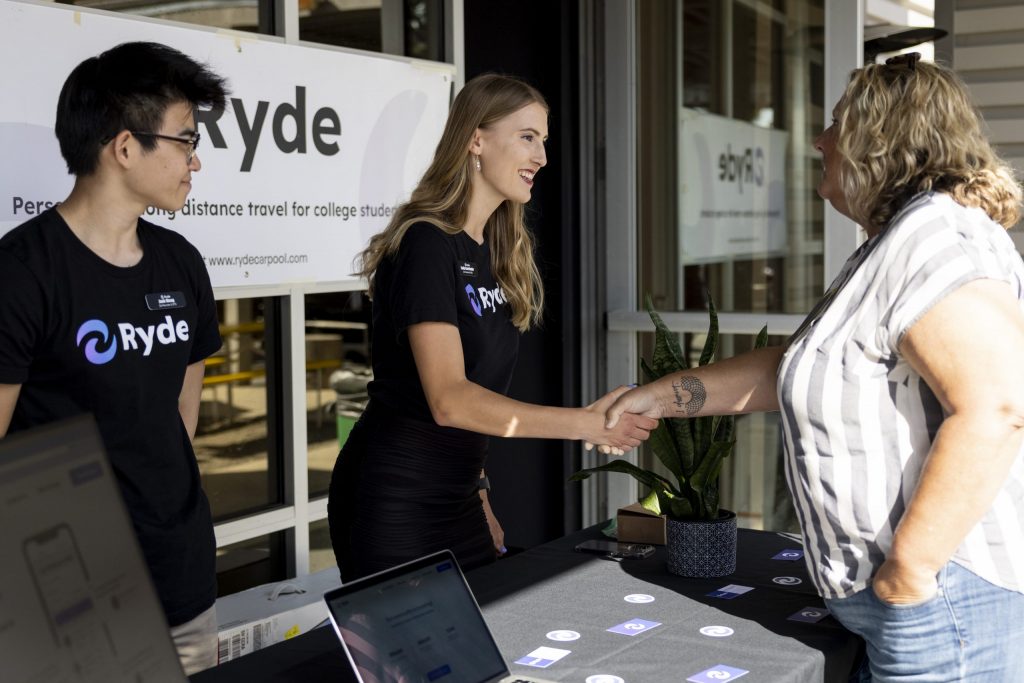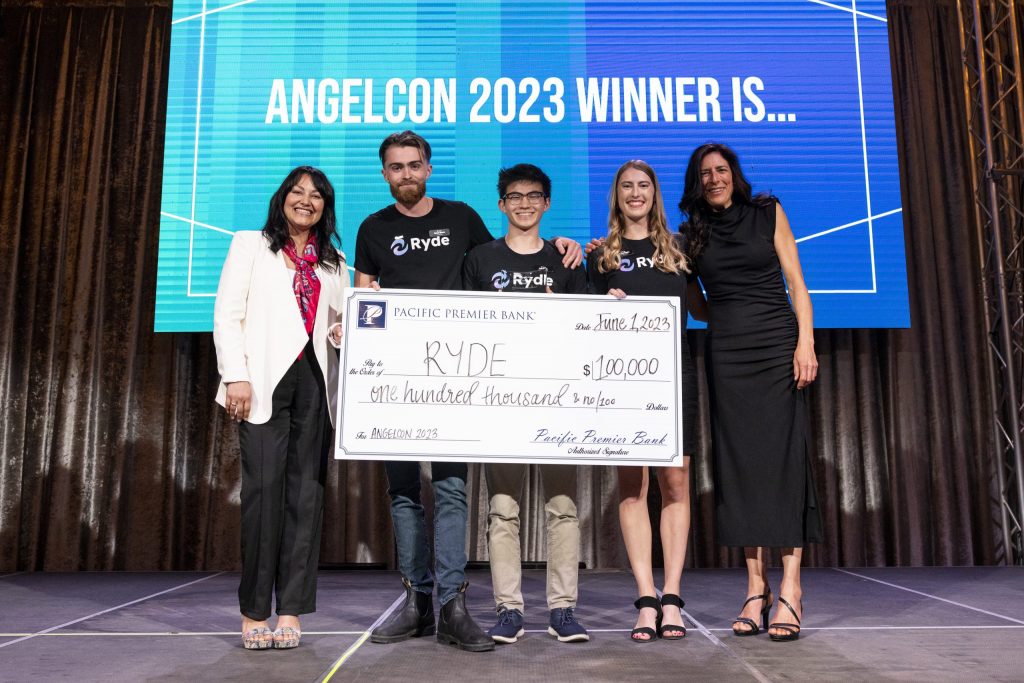One Ryde at a time: AngelCon winners look to reshape college traveling
IN THIS ARTICLE
- Latest news Topic
- Jorge Mercado Author
By Jorge Mercado Thursday, June 8th, 2023

June 12 update: A previous version of the article incorrectly stated Josh Wong’s last name in the photo caption. Additionally, corrections have been made to update the arrival of Emily Gavrilenko and Wong to the Ryde team as well as the make-up of the team.
Ride-sharing applications are nothing new in the world of Uber and Lyft, but even so, Ryde is trying — successfully — to make a name for itself.
Ryde, a San Luis Obispo-based company, recently won the sixth annual AngelCon competition, hosted by The Cal Poly Center for Innovation and Entrepreneurship (CIE) Small Business Development Center (SBDC).
The event, hosted June 1 at SLO Brew Rock in San Luis Obispo, raised a total of $140,000 and chose to invest in two startups.
By winning the competition outright, Ryde was awarded $100,000 in equity investment while the runner-up, DEMO, also received an investment totaling $40,000.
“It’s an awesome feeling,” Emily Gavrilenko, CEO of Ryde, told the Business Times.
“The startup journey is a roller coaster with its ups and downs and this is definitely one of the ups along the way. We think we have a billion-dollar idea but other investors validating that we’re onto something and then also giving us that money that will be really valuable runway as we continue going is special.”
Ryde is a peer-to-peer travel marketplace connecting student drivers with riders for long-distance travel.
Gavrilenko, 22 and a Cal Poly graduate with both a Bachelor’s and Master’s in computer science, recalled that when she was a freshman it was difficult getting back home to visit her family during holidays or even just a regular weekend.
“I took Amtrak the first time and it was twice as long as driving and three times as expensive compared to gas,” she said.
She then found out about Facebook groups where people would post where they are traveling and if people wanted to tag along.
“But those groups were very disorganized, took a lot of time, and is also a little awkward because you don’t really know who you’re getting in the car with.”
Ryde is solving that problem by becoming the one-stop marketplace for college students to connect with each other in order to facilitate rides.
The app is contingent on the driver being a university student and then only allowing fellow university students to accept rides.
“Knowing someone goes to that same university is a huge builder of trust and a majority of people wouldn’t even consider traveling with just anyone from the general population,” she said.
The biggest difference between them and Uber or Lyft is that in those cases, drivers are aiming to turn a profit, Gavrilenko said.
“They weren’t planning to make that trip from SLO to Santa Barbara so they have to take three hours to make that drive and get paid for it,” she said.
“For us, drivers are already going from point A to point B and they’re not driving for profit. They’re driving to reimburse the cost of gas.”
Because of that difference, a drive from SLO to Santa Barbara that would cost $150 on Uber could be as low as $15 on Ryde, Gavrilenko said.
Ryde then charges a 20% fee and that’s how it turns a profit.
Currently, the app, which only launched in the summer of 2022, has been “a hit” with the Cal Poly campus. Gavrilenko said 600,000 miles have been traveled by Ryde users.
It will be expanding to UC Santa Barbara in the fall and will also hit Cuesta College and Santa Barbara City College soon, Gavrilenko said.
Half of the $100,000 prize will go toward marketing efforts for its new launches in the fall while the other half will go toward product development, she added.
Ryde is still looking for another $100,000 in equity funding, at least. The team is currently made of up entirely Cal Poly students and is led by Gavrilenko as well as fellow co-founders Josh Wong and Johnny Morris.
Morris and Gavrilenko actually met because they had similar ideas for the company back in 2021.
“My first thought was ‘Oh, competition. I have to beat him to market,’” she said.
Instead, Gavrilenko joined up with Morris around the same time Wong did and together, the trio has amassed $100,000 in equity funding to show for it.
The hope is to one day be purchased by a bigger ride-sharing company, like Uber or Lyft, that will allow Ryde to go even further.
“I always felt like I had to go back to school and get my MBA or get a formal education and it wasn’t until the opportunity really presented itself that I decided to go all-in and it’s worked out great,” Gavrilenko said.
DEMO, the runner-up of the competition, won $40,000 and is led by CEO Alec Stallman, who is developing a platform where creators can sell collaboration rights to their content, earning money in the process.
Stallman told the Business Times he has been in the music industry for well over a decade and has already seen people gravitate toward the company’s business model.
Quantum Energy, creators of a comprehensive AI-driven software tool providing data for the cleantech industry, won the Audience Choice Award and received $1300 in prize money from the crowdfunding campaign.
The other three competitors were Zoetic Motion, a physical therapy platform that combines computer vision technology with gamification to provide patients with an engaging and effective recovery experience; VLab Education, which develops VR science experiments that give students a method of experiencing what it is like to be a scientist, regardless of their access to traditional lab resources; and MyMetaFi, a marketplace which enables users to collect, use, and trade the most valuable non-fungible tokens without having to pay full price.
email: [email protected]










